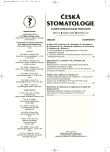-
Medical journals
- Career
Comparison of Reliability of Vth and VIth Generation Adhesive Systeme by Thermocycling
Authors: M. Vambera; E. Gojišová; P. Bradna
Authors‘ workplace: Výzkumný ústav stomatologický, Praha ; Stomatologická klinika 3. LF UK a FNKV, Praha
Published in: Česká stomatologie / Praktické zubní lékařství, ročník 107, 2007, 2, s. 36-38
Overview
The target of the thestudy was to compare the reliability of adhesive systems of Vth. and VIth generation by thermocycling according to method ISO/TS 11405 : 2003 (E). For comparison there were chosen two representatives from each group – from the Vth generation materials Single Bond Adper and Prime&Bond NT and from the VIth generation materials Prompt-L Pop Adper and Xeno III. The materials of the Vth generation were combined with advised etching gels and by all adhesives the directions for use were strictly followed. Adhesive systems were combined with material Spectrum TPH. Each adhesive system was tested on 10 samples of intact third molars. The results showed extensive variability among reliability single adhesives without dependence to generations, that means self-etch or conventional total-etch. While measuring microleakage according to ISO/TS 11405 : 2003 (E) was the most reliable Prime&Bond NT, with score 12, than Xeno III with score 26. Between reliability of Single Bond Adper (score 37) and Prompt L-Pop Adper (score 38) there was no significant difference. The results demonstrated no significant difference between single generations of adhesive systems and proved that the quality of each product is the most important, whether it belongs to self-etch or conventional total-etch generations.
Key words:
adhesive systems – thermocycling
Labels
Maxillofacial surgery Orthodontics Dental medicine
Article was published inCzech Dental Journal

2007 Issue 2-
All articles in this issue
- II. Titanium Modified with Hydroxyapatite and Zirconium – Biological Properties
- Fluoride Content in Bottled Waters Used in the Nutrition of Infants and Toddlers
- Comparison of Reliability of Vth and VIth Generation Adhesive Systeme by Thermocycling
- Most Frequent Contact Allergens of Oral Cavity and Lips
- Influence of Acidic Environment on Oral Cavity in Patients with Gastroesophageal Reflux
- Prosthetic Stage of Implant Treatment in Missing Incisor Cases
- Data Structuring and Modeling of Dental Documentation in a Form of Interactive Dental Cross
- Czech Dental Journal
- Journal archive
- Current issue
- Online only
- About the journal
Most read in this issue- Most Frequent Contact Allergens of Oral Cavity and Lips
- Influence of Acidic Environment on Oral Cavity in Patients with Gastroesophageal Reflux
- Prosthetic Stage of Implant Treatment in Missing Incisor Cases
- II. Titanium Modified with Hydroxyapatite and Zirconium – Biological Properties
Login#ADS_BOTTOM_SCRIPTS#Forgotten passwordEnter the email address that you registered with. We will send you instructions on how to set a new password.
- Career

